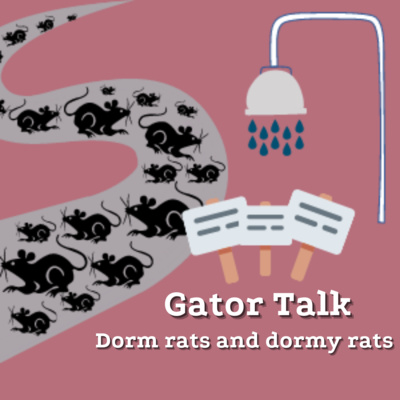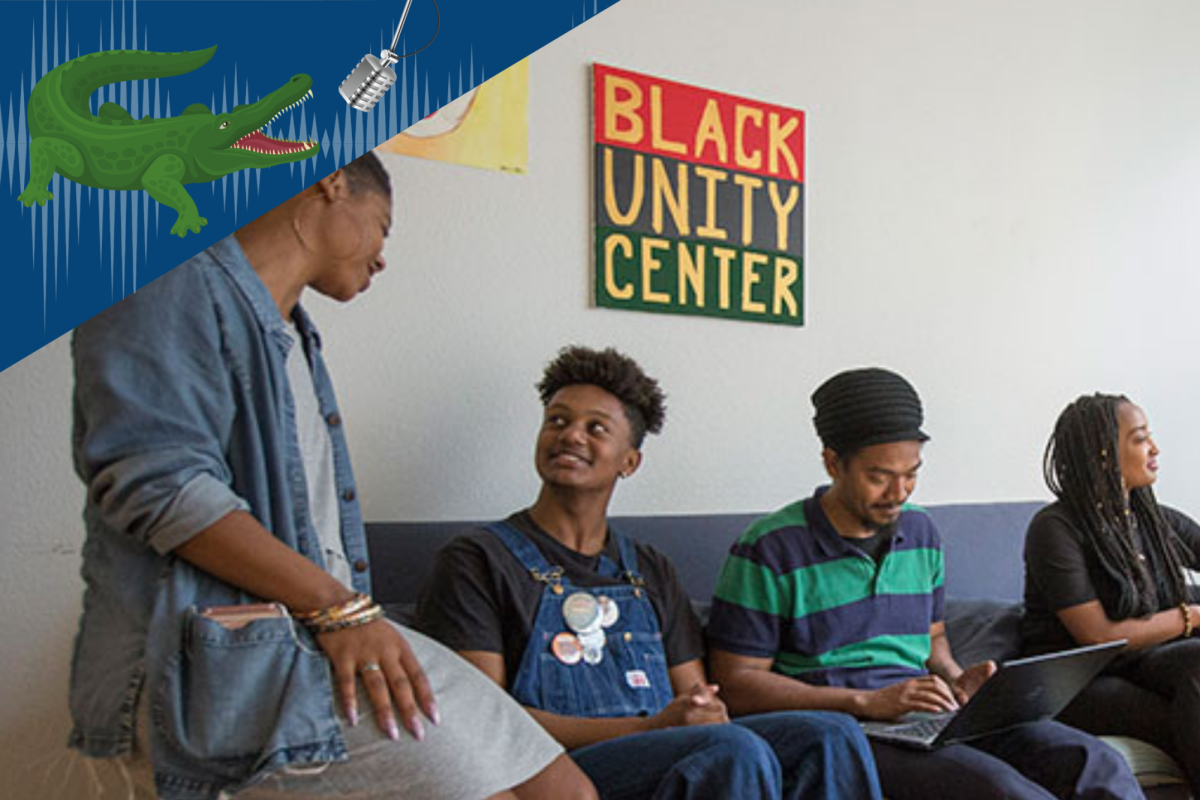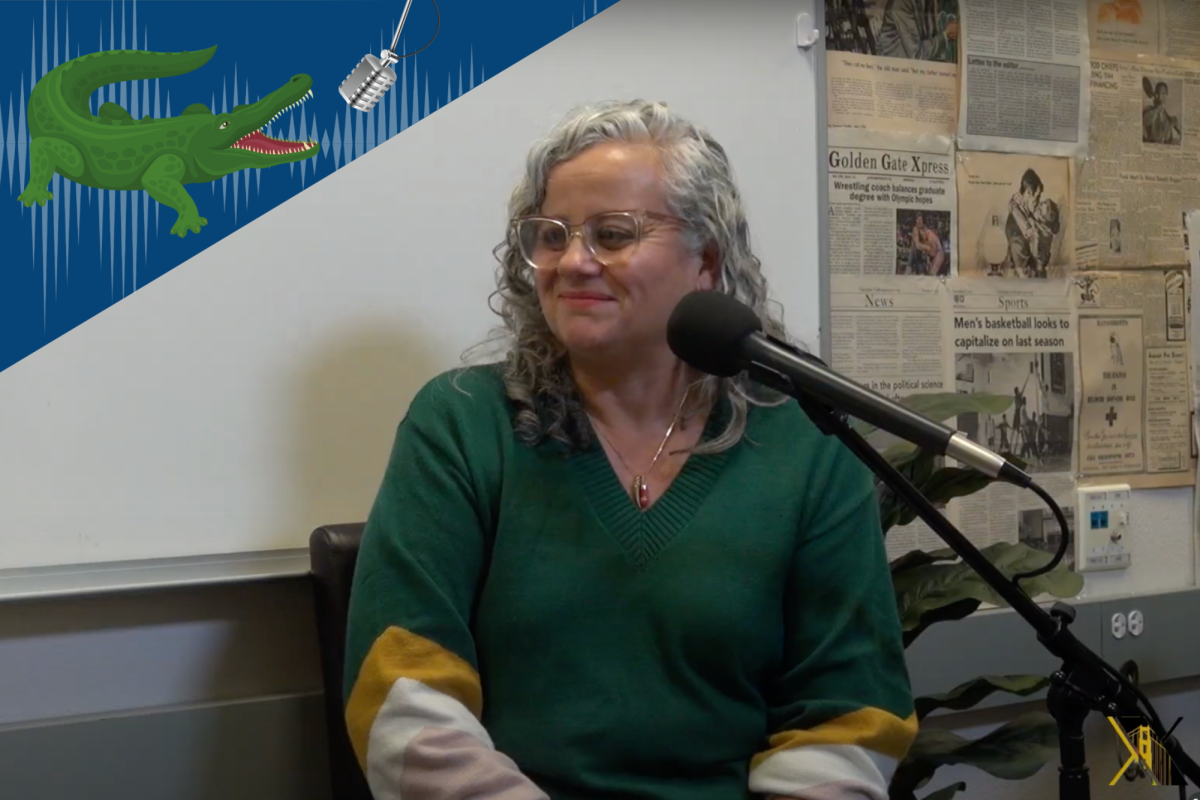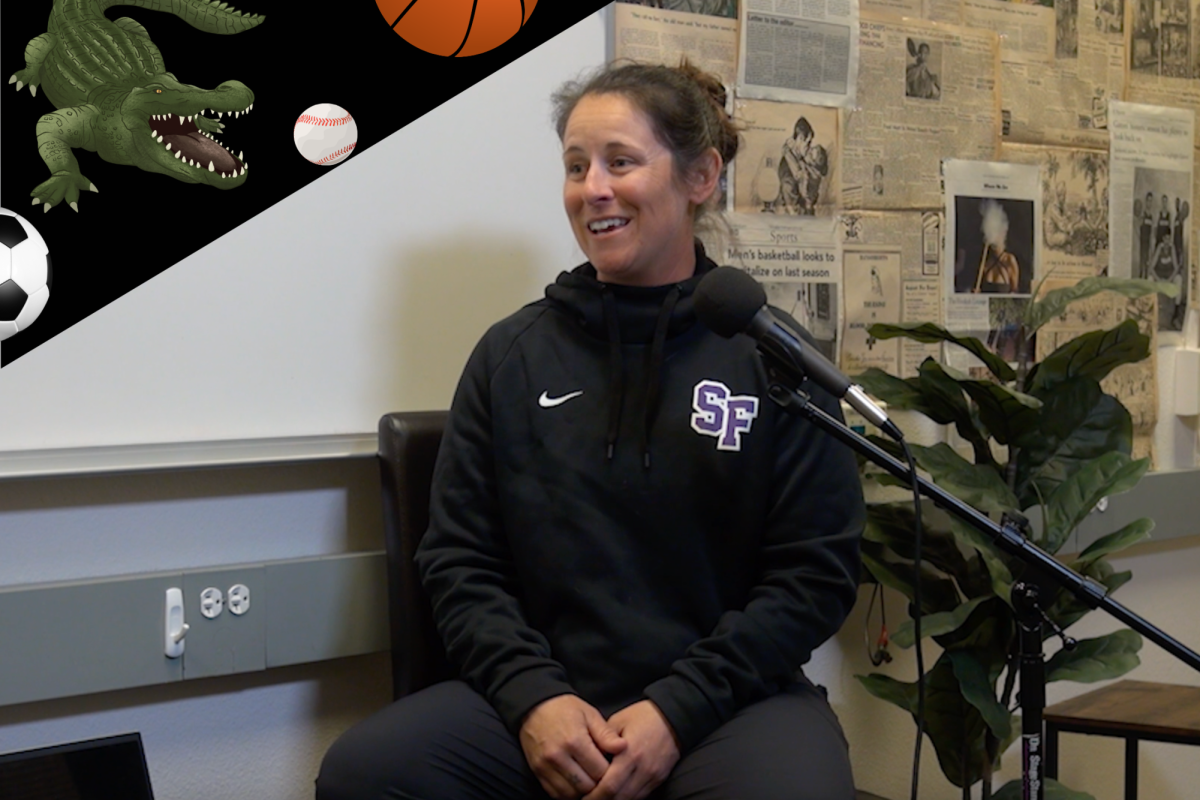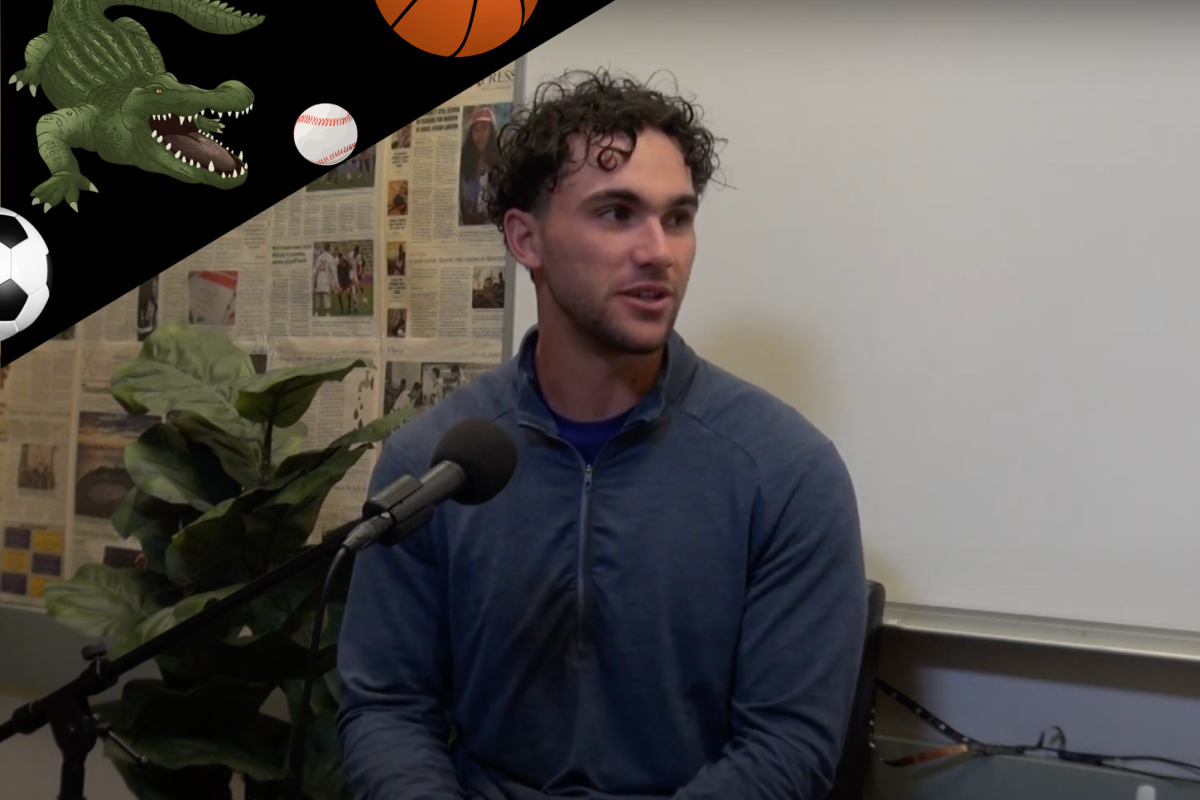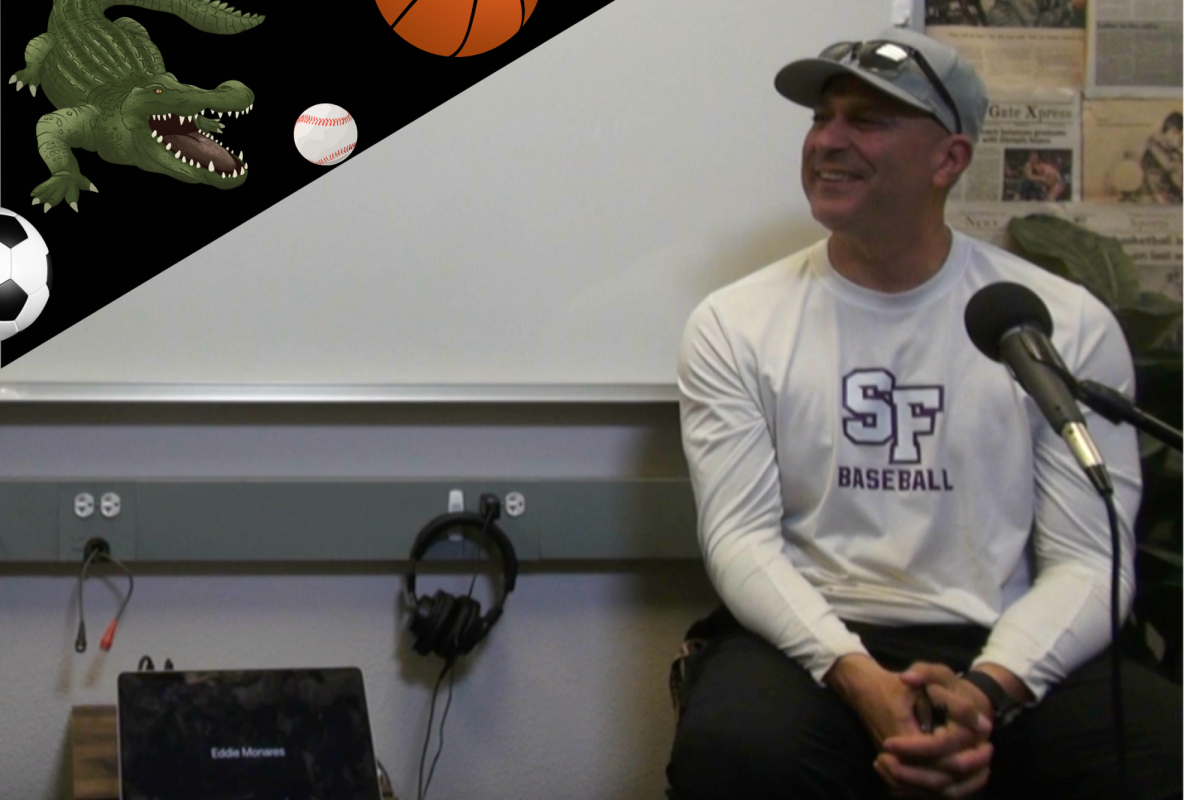Welcome to Gator Talk, a collaborative CalState podcast that brings city and statewide perspectives to SF State news.
Two months ago, a student reported a mice problem in the University Park North apartments. Editor-in-chief and co-host Chris Ramirez sat down with Facilities Services Vice President Frank Fasano to learn more about its response, and the issues students across on-campus housing are facing.
Check out the story here at Gator Talk.
Intro
Chris: Did you miss me? In case you’ve forgotten who I am from the lovely sound of my voice, I am Chris Ramirez, editor-in-chief and your co-host for Gator Talk. We’ve taken a little bit of a break as the semester has gotten more intense, but we’re back now!
Ready?
For more information/coverage, check out goldengatexpress.org and @GGXnews on all social media platforms.
Preview of the show
Chris: Here’s a run-down of today’s episode.
Today’s main story focuses on student housing. Two months ago, a student reported a rodent problem in the University Park North apartments.
Medina: Out of the corner of my eye, I hear something with a little weight, like, scurry out and then kind of just jumped under my cabinets. And I turned in, I screamed, I was like, ‘What?’ And that’s when I realized that all these little black speckles on the floor were actually rat feces.
Chris: I sat down with that student, Facilities Services, and other students on campus to learn more about the rodent situation and other issues students across on-campus housing are facing.
No, there’s no Remy in this episode, so hang on tight and let’s get right into it.
*Song ends*
Main Story
*Sound of mice, rats comes in, stops*
Chris: I don’t know about you, but I’m not a fan of rodents. I think I really started disliking them because of the PR disaster that was the black plague — and even though “Ratatouille” improved their image, it’s a no from me.
Chris: And it looks like I’m not the only one.
*Music starts*
Chris: In early October, SF State student Christian Medina reached out to Xpress with an email. The subject? “Pest problem in SF State Dorms.” And in that email were photos of rat droppings and a video of some rats in his dorm. Sheesh!
Chris: But before I explain that whole rat fiasco, let’s take a step back and start with Facilities Services at SF State.
*Music stops*
Chris: So, how does Facilities Services function?
I wasn’t quite sure myself, so I reached out and got in touch with Frank Fasano, the associate vice president of Facilities Services.
[interview audio]
Fasano: We are responsible for taking care of basically the physical space for the entire campus … and taking care of installations and repairs and service work orders, as well as project work to some degree.
[interview audio ends]
*Music starts*
Chris: He told me that since the pandemic hit, facilities had to shake up how it operates. That’s not to say its responsibilities changed, but more so the way it went around preserving the campus.
The start of the pandemic really emphasized services to core buildings and what he called “high touch areas.” That included the administration building, Student Services, labs in Thornton and Hensill halls, and dorms that students were living in. Basically, if things like bathrooms were cleaned once or twice a day, that was bumped up to two or three times a day, per CDC guidelines.
[interview audio]
Fasano: I liken this to cleaning or painting the Golden Gate Bridge — you get to the end of it, and then it’s probably time to start again. Our custodial staff has always been set up where it isn’t just someone who just goes to the building. There are specific staff members that are assigned to specific areas and buildings on campus. And so they would be the ones whose tasks would be the high touch areas, especially the bathrooms, the elevator buttons, and having a set schedule, just to be able to be in the building. And they would be in the building for their entire eight hour shift.
[interview audio ends]
Chris: And even in buildings not being used, facilities still had to tend to them, whether that be installing the new air ventilation systems or checking the water in the floor drain to prevent sewer gases from stinking up the building. Shout out to our custodial staff.
Basically, all that’s changed is the frequency in which these things are tended to. But I was still curious, how does facilities know when something isn’t working?
*Music ends*
Chris: They actually have cameras and mics set up in all the buildings to secretly listen to your complaints … I’m kidding! You have to fill out a work order.
[interview audio]
Fasano: Our work order system is the primary method of tracking and dispatching service requests and work order requests. The customer service center could get a call from anyone. And that would start the process of getting a concern or an issue into our work order management system, which is, again, used for initially tracking whatever service requests there were.
[interview audio ends]
Chris: Students can either call the customer service center or put in a work order request themselves through the facilities email. Once those work orders are made, they’re sent to the proper department to fix the issue, or it could go to a vendor that the university contracts.
All vendors have access to the work orders filed by facilities personnel, and from there, anyone who places a work order must communicate directly with the vendor. It wasn’t always that way though — vendors used to have keys to all buildings, but after one vendor lost their keys, the university had to pay to rekey all of housing. Sheesh.
And the lifespan of a work order really depends on the severity of the issue. AVP Fasano said that most work orders are categorized under priority two — urgent — and can take anywhere from a couple hours to weeks. These range from professors locking themselves out of their offices to clogged toilets. Priority one is reserved for bigger damage brought on by fires, earthquakes and larger events.
[interview audio]
Fasano: We get in excess of 24,000 work orders a year. And we start with a phone call with many of them. And many of those phone calls a very, very high percentage of those phone calls get turned into a work order.
[interview audio ends]
*Pause*
Chris: OK, OK. You’re probably wondering how this relates to Christian. But it’s important to know how facilities operates! Now we can talk about Stuart Little.
[interview audio]
Fasano: Sept. 15 was the first call. That was an isolated incident. And so, you know, I like to get the opportunity to clarify how things happen.
[interview audio ends]
Chris: After getting back to his UPN apartment from visiting his family, Christian noticed what he thought were crumbs by his door. He thought it was strange, but he didn’t think much of it until Sept. 15, when he saw a rodent.
AVP Fasano said that one of the major factors as to why rodents may be more likely to be seen is the drought. When underground water sources dry up, rodents will move to find alternatives. He also said that when construction for Marcus Hall started and the demolition of the science building began, it may have disturbed burrowing, causing the rodents to come out.
But anyway, Christian said he spoke with his RA that same day and then reached out to University Housing. He had someone from Facilities Services come over within the following 48 hours — but then, he said he heard nothing.
[interview audio]
Medina: All the exterminator did was just come and put traps — that was really it. He said he would tell housing that there’s holes behind the dishwasher and under the cabinets. But we waited for two weeks, and nobody came. Granted, I do admit that my roommates and I should have contacted housing a lot sooner about that.
[interview audio ends]
Chris: Christian and his roommates didn’t think anything much about it after that, thinking that the traps would do the trick. But on Oct. 3, he had another incident with a rodent.
[interview audio]
Medina: But for him, for my other roommate … it got into his room. And it was trapped in there. It got into his room while he was asleep. So the mouse gets in there. He realizes it’s in there, they’re both freaking out. And he’s like, ‘Dude, I don’t know what to do. I just called housing,’ and they essentially told him that he had to let the rat out. And I’m just sitting there, and I look at my- I’m looking at the messages. And I’m looking at my sister who was sitting across the table from me at the time. And I’m just like, ‘What the fuck is going on with this school?’
[interview audio ends]
Chris: That’s when Christian sent out the email that Xpress got. Then, the Dean of Students Office reached out to Christian and worked with facilities to get a second pest control inspection. AVP Fasano said Facilities was then alerted about the leaks, and they were fixed the next day.
But for Christian, it was already too late. He turned his keys back into the housing office on Oct. 7, citing financial reasons for moving out — in total, this took a little over three weeks to resolve.
[interview audio]
Chris: Do you think that university housing is worth the price then?
Medina: No, no, I don’t. I moved in the first day, and I found that I couldn’t even charge my goddamn laptop … One of the chairs had a nail sticking out of it. And it poked me in the leg, and I’m very glad that it didn’t cut me, so that chair was relegated to the corner the entire time. I was there. I’m sure it’s still there. But yeah, I mean, UPN is just missing so much … I mean, I’m not expecting a super duper clean room that I can eat off the floor. No, it’s a university dorm. I know what I’m paying for, but at the same time, this isn’t the like, this isn’t even the bare minimum. It’s like the bar’s in hell. And that was like yeah, that was it for me. I’m like, why are you charging me so much money?
[interview audio ends]
Chris: We’re gonna take a quick break to lay some mousetraps. We’ll be right back –
Break
Support the Golden Gate Xpress’ work by signing up for our online newsletter, following us on Instagram and Twitter @ GGXnews and visiting the website: https://goldengatexpress.org
Interested in advertising with GGX? Check out our advertising page on goldengatexpress.org/advertising.
*Break ends*
Cont. Main Story
Chris: And we’re back! The only rodents I found were our editors. Oh well.
So now that AVP Fasano cleared things up with me, I thought I was practically done with my reporting. But then I got a tip that there was an issue with the water heater in the Centennial Village dorms, so I did what anyone would do: I went to campus to talk to some students.
[interview audio]
Breanna Guzman: I was walking like it was freezing outside too. I was walking. I was like, ‘Oh, I can’t wait for this hot shower.’ And then I get in there. And it’s just freezing water.
[interview audio ends]
Chris: That’s Breanna Guzman, a student resident in the village.
[interview audio]
Breanna Guzman: I just sucked it up and just did it because I was like, I had already called them for so many other things. So I was just like, let me just suck it up. And I talked to a friend too. And she had the same problem. She had gotten back from the gym, and she was waiting for that hot shower. And she did not get it …
Chris: What other problems have you had with I guess facilities or just maintenance overall?
Guzman: “We have a trash room, and the trash room wasn’t taken out for like, a month and a half. And it was just overflowing and it smelled — the whole building — and it was so bad. Like it was actually disgusting.”
[interview audio ends]
Chris: And she wasn’t the only one.
I also ran into SF State students Tina Nguyen, Isabella Sanchez and Mamadou Ba. And similar to Christian, they all had mixed reviews as to whether university housing was worth the price.
[interview audio]
Tina Nguyen: At the beginning, they’re like, let it run for 30 minutes. Like, that’s what the maintenance people said. But now I think at the beginning it was like five minutes or so. But now it’s only like two minutes … We actually had an issue of black mold under our sink too. So I think just fixing, especially health issues such as mold, I feel like checking it before I move-in day and stuff, because we had to call facilities ourselves to get it cleaned up. And yeah, just like little stuff like that.
Isabelle Sanchez: I woke up for class. And it was actually a 9:30 a.m. class. And I was like, ‘Hey, I’m just gonna get in the shower and wake up.’ And I was like, ‘It’ll warm up, it’ll warm up.’ I’m trying to be optimistic, but it did not warm up. So I was all wet, and I was freezing. And I think it happened the next day after that, too. But a few of us were just stinky for a day.
Mamadou Ba: The washing machines, like that’s been a huge issue lately … their main issue was that they weren’t reading the cards. Like they fully work like full operations, kind of like the water and drying all that stuff. But it’s the fact that like, when you put in your card, like it just doesn’t read it well. And like it also works practically we are told that it’s a power outage issue. Sometimes it doesn’t work, sometimes it doesn’t … last week or the weekend last week, where like nearly every washing machine within these communities were broken — nearly every single one. Nearly every single one, like towers is busted, towers kids will go here. Like it was bad and then they were broken, it was the fact that like, oh, like there was still stacking our kids are still like, behind on their laundry. So when I did it, it was like, I was waiting to grab the one last of a washing machine or dryer.
[interview audio ends]
Chris: Unlike Christian, these people all agreed that a lot of these issues seemed to be resolved in a reasonable amount of time once facilities was aware of them, but they were confused as to why these issues were happening in the first place, or why these issues weren’t resolved before they moved in. And that comes down to the workforce too. AVP Fasano brought up the fact that last year, the university’s $40 million budget deficit resulted in 72 layoffs, with 68 being from the union representing custodial workers and groundworkers. Since last fall, 24 have been rehired.
But I still wanted to know more, so I poked around a little bit, and I learned that some of the most impacted have been the RAs on campus.
[interview audio]
Olivia Gillette: I was actually hired only two weeks before the school year started this year, I was an emergency hire. So they never planned on opening Mary Ward. They opened it last minute. And then they needed people because they didn’t have enough RAs hired. So they basically just called me and said, ‘Your grades are good. Do you want to be an RA?’ And I was like, ‘OK, free housing. Why not?’
[interview audio ends]
Chris: That was Olivia Gillette, a now-former RA in the Mary Ward dorms on campus. Originally, both Mary Ward and Mary Park were going to be closed this semester. But because of how long the waitlist for university housing was, the university decided in late July to open up Mary Ward for student residents. And students who have COVID-like symptoms can quarantine in Mary Park.
Olivia talked a lot about the same issues that the student residents mentioned earlier. She said that before being able to move into Mary Ward, she was in Towers because of some plumbing issues. Once she moved into the Marys, she still had to run the water for long periods of time to get warm, and the heat and elevators weren’t working. And a lot of this is because of the fact that these buildings were vacant throughout the pandemic.
Olivia also said that despite getting training, there wasn’t anything specific for COVID. She said that the overall attitude from Residential Life was that the university’s protocol for student residents would suffice.
[interview audio]
Gillette: I was told, probably in September, that a COVID positive student was going to come to the front desk, and they needed to get isolation keys and a cart to move their stuff over to Mary Park. And I didn’t want to do it just because I didn’t know that that was something I signed up for. They sort of promised in the past, like, ‘Oh, you guys won’t have to deal with it. Like, everyone’s vaccinated, don’t worry.’ But then when I was put in that position, I was like, ‘Oh, I don’t know if I can do this. It’s a little too close for comfort.’ So I did tell my supervisor, Alvin, at the time that I was uncomfortable, and he basically told me just do it, which was very terrible. Like, that really upset me. I mean, I did it — it was my job. But it just felt like he was really dismissive. Like he didn’t care. And then when I talked about it later with him, he said, ‘Well, you wore a mask, right?’ And I was like, yeah. And he was like, ‘And you were vaccinated?’ And I was like, Yes. And he was like, ‘Then you’re fine.’ Like, he thought it was no big deal. But to me, it was like, a little weird.
[interview audio ends]
Chris: I talked to some of the higher-ups in ResLife, and they said there was COVID training, but a lot of it was actually sprinkled into the standard training RAs get. Conflict-resolution between roommates, for example, that’s done remotely or through one-on-one meetings instead of group meetings. They also said that RAs were told that they may be giving things like keys to COVID-positive residents, but that those interactions were contact-free.
Olivia wasn’t alone in feeling upset though. There was wide discontent across many of the RAs, and this came to a head at the RA monthly meeting in October. In addition to some required training, Olivia said RAs were promised 30 minutes to voice their concerns and get responses, only to find out that the time was reduced to 15 minutes. When their supervisors didn’t respond to their questions, they decided to log off in protest.
That’s when some of the Mary Ward RAs actually considered going on strike. Most of these RAs are new though and weren’t here pre-pandemic, so they reached out to former RAs for help. They suggested that rather than strike, they go to Mahoney. And that’s exactly what they did.
Four weeks ago, a group of RAs met with President Mahoney and administrators in ResLife, describing what they said is a lack of communication from their supervisors and lack of response to the issues in the dorms. Olivia wasn’t there, but she said that those who were there told her that it seemed like Mahoney really listened to them.
*Pause*
Chris: I talked to Student Affairs and Enrollment Management VP Jamillah Moore and she said that this was the first time she found out about these issues. She said that since that meeting, ResLife has been working with current RAs to resolve some of these issues. She said that issues with water and heating have been resolved, and that they are currently working on addressing a lag in how Facilities receives work orders now.
[interview audio]
VP Moore: I can tell you that we are doing more check-ins earlier and often and making ourselves completely available and accessible to the group so that no one ever gets this level of frustration again. And so one of the first things we did was we said, “Hey, we’re sorry, we didn’t know. But now that we know, we’re going to do better.”
[interview audio ends]
End
And that was the episode.
Don’t log off yet because our newsbrief is here now. Ask Seb.
News brief
The first confirmed case of the Omicron variant in the U.S. was found here in San Francisco on Wednesday. Local elected officials and President Biden say that the variant is reason for concern, but it isn’t reason for panic. Health officials are urging people to continue getting vaccinated and booster shots, so stay safe everyone.
And that’s all I got! This is Chris Ramirez, editor-in-chief and your co-host for Gator Talk.
We’ll be back next semester after a long winter break.
And with that, I’m out.






